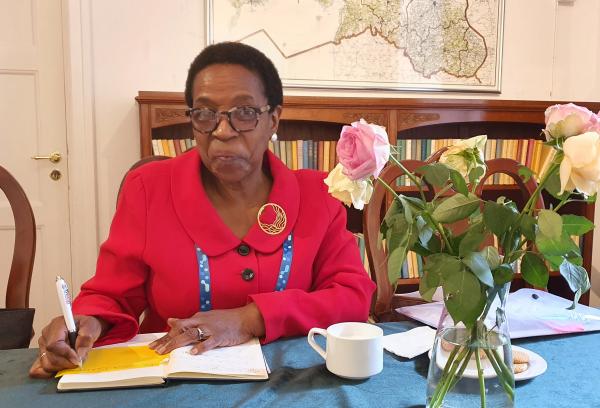Women in Water Diplomacy Network launches new strategy
By Tobias Schmitz
2 Sep 2022 by The Water Diplomat
Stockholm

Yodit Balcha was a senior advisor at the water ministry in Ethiopia who early in her career was amongst a small group of women contributing to water negotiations. Through the Women in Water Diplomacy Network and the support of her Minister however, she rapidly gained confidence in her work. This kind of work is at the heart of the new Global Strategy of the Women in Water Diplomacy Network. The strategy departs from the observation that transboundary cooperation is not gender neutral: it is informed and shaped by the experience, perspectives and knowledge of the people around the decision-making table. A lack of inclusion in decision making can cause harm to the most vulnerable in society and risk relapse of water conflicts. According to Dr Zodwa Dlamini, former Chief Delegate and Permanent Representative of the Lesotho Highlands Water Commission, who is currently a member of the leadership group who drafted this strategy, water diplomacy is not just about transboundary cooperation: it is also about empowerment through skills transfer, mentoring, training, and inclusion. The perception that those who are in the water diplomacy space have the ‘fiefdom’ over water diplomacy is simply not true: those at lower levels in the water diplomacy field are actively negotiating water issues and need to be supported to make their voices heard. Since 2013, the Stockholm International Water Institute (SIWI) has paid attention to gender equality in its programmes, building on the insights in a 2013 paper by Anton Earle and Suzan Basili. The paper charted the waters for a more inclusive approach to transboundary water management. A later paper argued that increasing women’s’ participation in and influence on water governance processes is critical to the improvement of services, reduction of inequalities, and mitigation of conflicts.
In 2017, SIWI convened a pilot forum in Uganda, and in 2018 a second Forum of the Women in Water Diplomacy Network was convened in Ethiopia. In 2019 a Policy Brief on women’s water leadership in the Nile basin emphasised that the consistent failure to include women in decision making at the transboundary level undermined progress towards cooperative and sustainable development. With the emergence of a strong network, a string of research initiatives began to emerge and the data on the role of gender in decision making in transboundary water management, extending the scope of information from the Nile to Central Asia and the Rhine Basin. A Women in Water Diplomacy Network in the Nile, launched in 2017, had gained strength as a community of practice, and the ambition began to extend beyond the Nile Basin to other transboundary settings. In 2021 a Women in Water Diplomacy Network Leadership Council was formed, attracting some of the world’s most experienced water diplomats. This leadership began to work on the network’s objectives and develop a new strategy.
The new strategy has five principal aims. The first is to improve gender equality in high level decision making in transboundary basins, with a focus on enhanced women’s leadership in decision making in the Nile Basin, other African Basins, and the rest of the world. Secondly, the Network aims to strengthen technical and research cooperation to enhance coordination and shared understanding of existing challenges and their solutions. Third, the Network aims to enhance dialogue, exchange of knowledge and experience around intersecting themes in water diplomacy related to gender. Fourth, the Network aims to contribute to the empowerment of young water diplomats by fostering the exchange of experience with established diplomats and empowering early career development. Lastly, the Network seeks to engage new core and thematic partners to help support the Network in the Nile Basin and develop similar networks in other basins in Africa and beyond.
